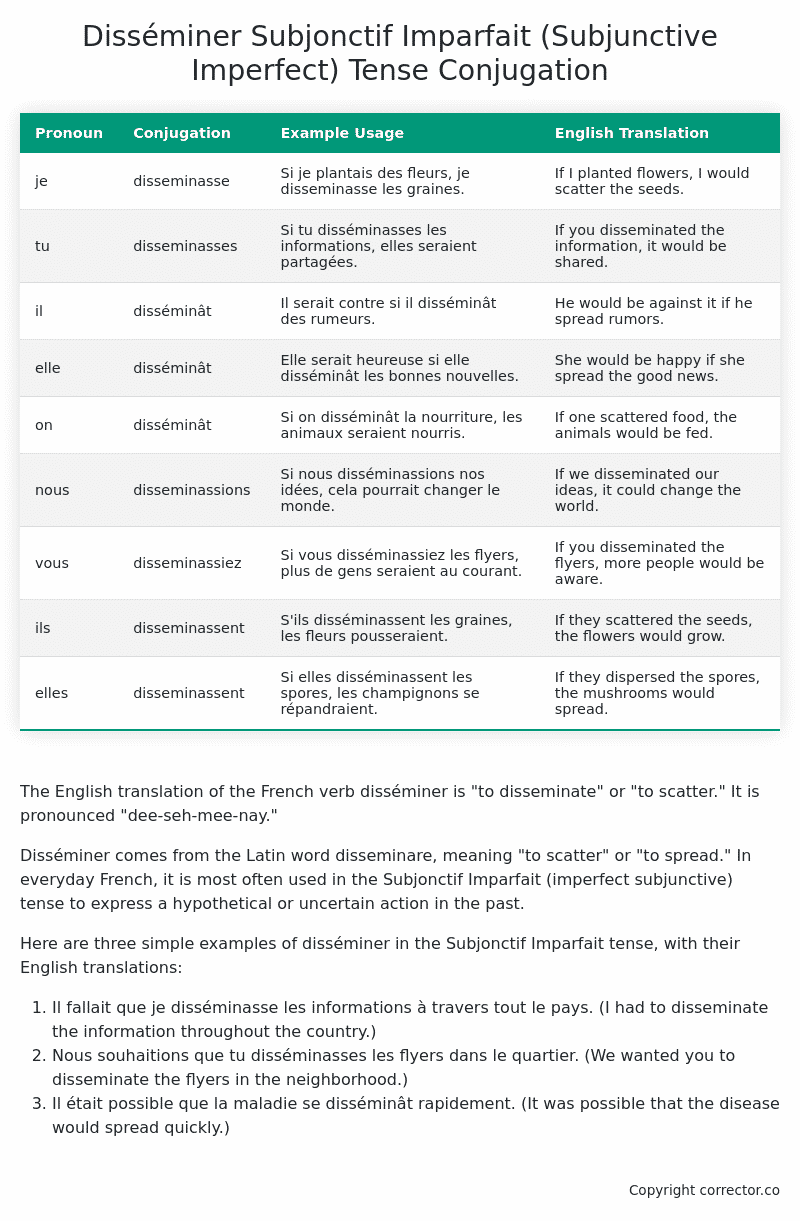Subjonctif Imparfait (Subjunctive Imperfect) Tense Conjugation of the French Verb disséminer
Introduction to the verb disséminer
The English translation of the French verb disséminer is “to disseminate” or “to scatter.” It is pronounced “dee-seh-mee-nay.”
Disséminer comes from the Latin word disseminare, meaning “to scatter” or “to spread.” In everyday French, it is most often used in the Subjonctif Imparfait (imperfect subjunctive) tense to express a hypothetical or uncertain action in the past.
Here are three simple examples of disséminer in the Subjonctif Imparfait tense, with their English translations:
- Il fallait que je disséminasse les informations à travers tout le pays. (I had to disseminate the information throughout the country.)
- Nous souhaitions que tu disséminasses les flyers dans le quartier. (We wanted you to disseminate the flyers in the neighborhood.)
- Il était possible que la maladie se disséminât rapidement. (It was possible that the disease would spread quickly.)
Table of the Subjonctif Imparfait (Subjunctive Imperfect) Tense Conjugation of disséminer
| Pronoun | Conjugation | Example Usage | English Translation |
|---|---|---|---|
| je | disseminasse | Si je plantais des fleurs, je disseminasse les graines. | If I planted flowers, I would scatter the seeds. |
| tu | disseminasses | Si tu disséminasses les informations, elles seraient partagées. | If you disseminated the information, it would be shared. |
| il | disséminât | Il serait contre si il disséminât des rumeurs. | He would be against it if he spread rumors. |
| elle | disséminât | Elle serait heureuse si elle disséminât les bonnes nouvelles. | She would be happy if she spread the good news. |
| on | disséminât | Si on disséminât la nourriture, les animaux seraient nourris. | If one scattered food, the animals would be fed. |
| nous | disseminassions | Si nous disséminassions nos idées, cela pourrait changer le monde. | If we disseminated our ideas, it could change the world. |
| vous | disseminassiez | Si vous disséminassiez les flyers, plus de gens seraient au courant. | If you disseminated the flyers, more people would be aware. |
| ils | disseminassent | S’ils disséminassent les graines, les fleurs pousseraient. | If they scattered the seeds, the flowers would grow. |
| elles | disseminassent | Si elles disséminassent les spores, les champignons se répandraient. | If they dispersed the spores, the mushrooms would spread. |
Other Conjugations for Disséminer.
Le Present (Present Tense) Conjugation of the French Verb disséminer
Imparfait (Imperfect) Tense Conjugation of the French Verb disséminer
Passé Simple (Simple Past) Tense Conjugation of the French Verb disséminer
Passé Composé (Present Perfect) Tense Conjugation of the French Verb disséminer
Futur Simple (Simple Future) Tense Conjugation of the French Verb disséminer
Futur Proche (Near Future) Tense Conjugation of the French Verb disséminer
Plus-que-parfait (Pluperfect) Tense Conjugation of the French Verb disséminer
Passé Antérieur (Past Anterior) Tense Conjugation of the French Verb disséminer
Futur Antérieur (Future Anterior) Tense Conjugation of the French Verb disséminer
Subjonctif Présent (Subjunctive Present) Tense Conjugation of the French Verb disséminer
Subjonctif Passé (Subjunctive Past) Tense Conjugation of the French Verb disséminer
Subjonctif Imparfait (Subjunctive Imperfect) Tense Conjugation of the French Verb disséminer (this article)
Subjonctif Plus-que-parfait (Subjunctive Pluperfect) Tense Conjugation of the French Verb disséminer
Conditionnel Présent (Conditional Present) Tense Conjugation of the French Verb disséminer
Conditionnel Passé (Conditional Past) Tense Conjugation of the French Verb disséminer
L’impératif Présent (Imperative Present) Tense Conjugation of the French Verb disséminer
L’infinitif Présent (Infinitive Present) Tense Conjugation of the French Verb disséminer
Struggling with French verbs or the language in general? Why not use our free French Grammar Checker – no registration required!
Get a FREE Download Study Sheet of this Conjugation 🔥
Simply right click the image below, click “save image” and get your free reference for the disséminer Subjonctif Imparfait tense conjugation!

Disséminer – About the French Subjonctif Imparfait (Subjunctive Imperfect) Tense
Formation
Common Everyday Usage Patterns
Interactions with Other Tenses
Subjonctif Présent
Indicatif Passé Composé
Conditional
Conditional Perfect
Summary
I hope you enjoyed this article on the verb disséminer. Still in a learning mood? Check out another TOTALLY random French verb conjugation!


